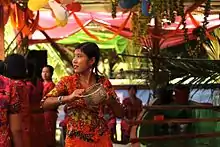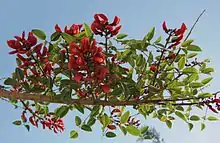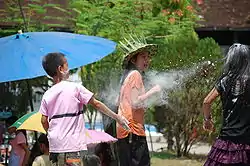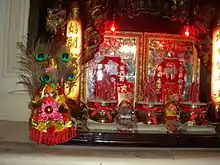Songkran
Songkran is a term derived from the Sanskrit word, saṅkrānti (or, more specifically, meṣa saṅkrānti) and used to refer to the traditional New Year celebrated in Thailand, Laos, Cambodia, Myanmar, Sri Lanka, parts of northeast India, parts of Vietnam and Xishuangbanna, China.[1][2] It begins when the sun transits the constellation of Aries, the first astrological sign in the Zodiac, as reckoned by sidereal astrology.[3] It is related to the equivalent Hindu calendar-based New Year festivals in most parts of South Asia which are collectively referred to as Mesha Sankranti.
| Songkran | |
|---|---|
| Official name | Different names denote the festival across South and Southeast Asia |
| Also called | Southeast Asian New Year |
| Observed by | Thais, Laotians, Cambodians, Sri Lankans, Burmese, Dai, Tai Dam and certain ethnic groups of northeast India |
| Significance | Marks the new year |
| Date | Generally 13–14 April |
| 2020 date | 13–15 April |
| Frequency | Annual |
| Related to | Mesha Sankranti |
Songkran celebrations involve a variety of diverse traditions practiced in the many countries and regions that celebrate the traditional New Year festival | |||||||
Songkran New Year Festivals
- Cambodian New Year, in Cambodia
- Lao New Year, in Laos
- Sinhalese New Year, in Sri Lanka
- Songkran (Thailand)
- Thingyan, in Myanmar
- Sangken, in Arunachal Pradesh and parts of Assam, India
- Water-Sprinkling Festival, in Xishuangbanna in China and parts of northern Vietnam.[4][5]
Festivities outside of Asia
Australia
Songkran celebrations are held in many parts of the country. One of the most notable celebrations is at the Wat Pa Buddharangsee Buddhist Temple in the Sydney suburb of Leumeah, New South Wales. The festival attracts thousands of visitors each year and involves a water fight, daily prayer, dance performances and food stalls which serve food of Thai, Burmese, Cambodian, Laotian, Sri Lankan and Malaysian origin.[6][7] In 2014, the celebration was attended by more than 2000 people.[8] Similarly in the same suburb, the Mahamakut Buddhist Foundation organizes a Songkran celebration featuring chanting, blessing, a short sermon, a fund raising food fete and Southeast Asian traditional dances.[9] Large scale Thai New Year (Songkran) celebrations are held in Thai Town, Sydney in the popular tourist suburb of Haymarket, New South Wales.[10] In Melbourne, the Sinhalese (Sri Lankan) New Year festival is held annually in Dandenong, Victoria.[11] In 2011, it attracted more than 5000 people and claims to be the largest Sinhalese New Year Festival in Melbourne.[12] The Queen Victoria Market held a two-day Songkran event celebrating the Thai New Year in early April 2017.[13] Songkran celebrations celebrating the Thai, Cambodian, Lao, Burmese and Sri Lankan New Year festivals are well known and popular among the residents of the Sydney suburb of Cabramatta, New South Wales which is home to large populations of Cambodians, Laotians and Thais.[14] Temples and organisations hold celebrations across the suburb including a large Lao New Year celebration in the neighbouring suburb of Bonnyrigg organised in partnership with the Fairfield City Council.[15][16] In the Melbourne suburb of Footscray, Victoria a Lunar New Year celebration initially focusing on the Vietnamese New Year has expanded into a celebration of the Songkran celebrations of the Thais, Cambodians, Laotians and other Asian Australian communities such as Chinese who celebrate the New Year in either January/February or April.[17] Taronga Zoo in Sydney, New South Wales celebrated the Thai New Year in April 2016 with its Asian elephants and traditional Thai dancers.[18]
United States
Songkran celebrations often occur in cities which host large Sri Lankan, Thai, Burmese, Laotian and Cambodian populations. The UW Khmer Student Association hosts a new year celebration at the University of Washington in Seattle. The White Center Cambodian New Year Street Festival is held at the Golden House Bakery & Deli in Seattle.[19] The Los Angeles Buddhist Vihara in Pasadena, California celebrates the Songkran festival with a focus on the Sri Lankan New Year. The Brahma Vihara in Azusa, California also holds celebrations with a Burmese New Year focus.[20] The International Lao New Year Festival is held annually in San Francisco and celebrates the Lao New Year with acknowledgment of other Asian communities, Thai, Cambodian, Burmese, Sri Lankan and the Dai people of southern China, who also celebrate the same festival.[21] In February 2015, the Freer and Sackler gallery in Washington D.C. held a Lunar New Year event celebrating the "Year of the Sheep" which also celebrated the Lunar New Year that occurs in mid-April for many other Asian countries. It included activities, information and food from China, Korea, Mongolia, Sri Lanka and other Asian countries that celebrated either of the two new year celebrations.[22] Similarly in 2016, The Wing in Seattle held a Lunar New Year celebration centered around the East Asian Lunar New Year however also focused on New Year customs in Laos as part of its "New Years All Year Round" exhibit.[23]
Notes
See also
- South and Southeast Asian New Year
- List of Buddhist festivals
- Mesha Sankranti, the term used to refer to the related Hindu calendar-based New Year festivals of April
- Water Festival, a tradition practiced during certain Songkran celebrations
- Buddhist calendar
References
- "制造传统 关于傣族泼水节及其相关新年话语的研究". Open Times. February 2010. Retrieved 17 January 2017.
- "Donald K. Swearer The Buddhist World of Southeast Asia" (PDF). Ahandfulofleaves.org. Retrieved 7 January 2019.
- "Archived copy". Archived from the original on 2016-12-08. Retrieved 2017-01-16.CS1 maint: archived copy as title (link)
- Planet, Lonely (21 March 2011). "The Dai water-splashing festival: where China meets Southeast Asia". Lonely Planet. Retrieved 7 January 2019.
- "Archived copy". Archived from the original on 2016-08-09. Retrieved 2016-06-05.CS1 maint: archived copy as title (link)
- "Songkran - Sth East Asian New Year Fete - Travel Blog". Travelblog.org. Retrieved 7 January 2019.
- "Celebrate: Songkran". Sbs.com.au. Retrieved 7 January 2019.
- "Buddhists celebrate New Year". Dailytelegraph.com.au. 28 April 2014. Retrieved 7 January 2019.
- "Mahamakut Ragawithayalai Foundation - Wat Pa Buddharangsee Buddhist Forest Monastery". Mahamakut.org.au. Retrieved 7 January 2019.
- "Sydney Haymarket & China Brochure" (PDF). Haymarketchamber.org.au. Retrieved 7 January 2019.
- "The biggest Sinhala New Year Festival in Melbourne - "Dandenong Bakmaha Ulela"". SBS Your Language. Retrieved 7 January 2019.
- "Sinhalese New Year". Dandenong.starcommunity.com.au. 20 April 2011. Retrieved 7 January 2019.
- "Thai Songkran New Year Festival - City of Melbourne". 26 March 2017. Archived from the original on 26 March 2017. Retrieved 7 January 2019.
- Thang Ngo (14 April 2013). "Lao, Khmer, Thai New Year 2013 in Sydney". Noodlies.com. Retrieved 7 January 2019.
- "Lao New Year Festival 2015 - AMUST". Amust.com.au. Retrieved 7 January 2019.
- "New Leaf" (PDF). Newleafcommunitites.com.au. 2017. Retrieved 7 January 2019.
- "East Meets West Lunar New Year Festival - Maribyrnong City Council". 7 January 2017. Archived from the original on 7 January 2017. Retrieved 7 January 2019.
- "Archived copy". Archived from the original on 2016-12-30. Retrieved 2016-12-30.CS1 maint: archived copy as title (link)
- ago, Rosin Saez • 3 years (12 April 2016). "April Marks The New Year For Southeast Asians". Ethnicseattle.com. Retrieved 7 January 2019.
- "Wisdom Quarterly: American Buddhist Journal: Happy Southeast Asian Buddhist New Year!". Wisdomquarterly.blogspot.com. 13 April 2013. Retrieved 7 January 2019.
- "Archived copy". Archived from the original on 2017-01-02. Retrieved 2017-01-02.CS1 maint: archived copy as title (link)
- "Celebrate the Lunar New Year at Freer-Sackler". Bento.si.edu. Archived from the original on 24 October 2017. Retrieved 7 January 2019.
- "Family Programs > Wing Luke Museum". 2 January 2017. Archived from the original on 2 January 2017. Retrieved 7 January 2019.





